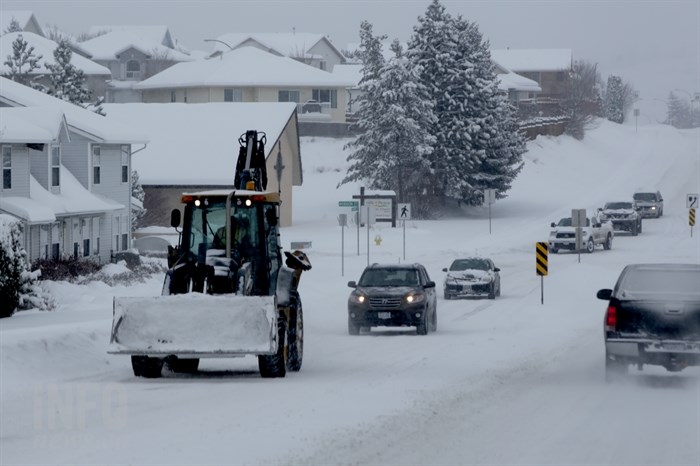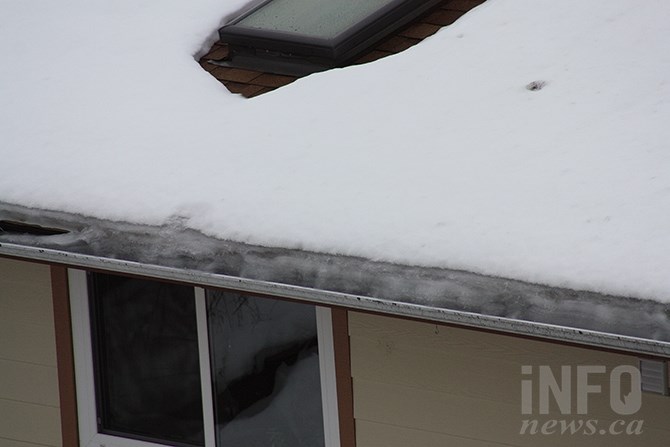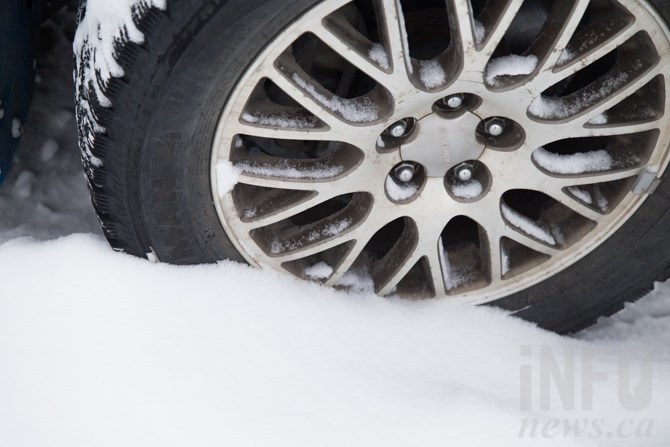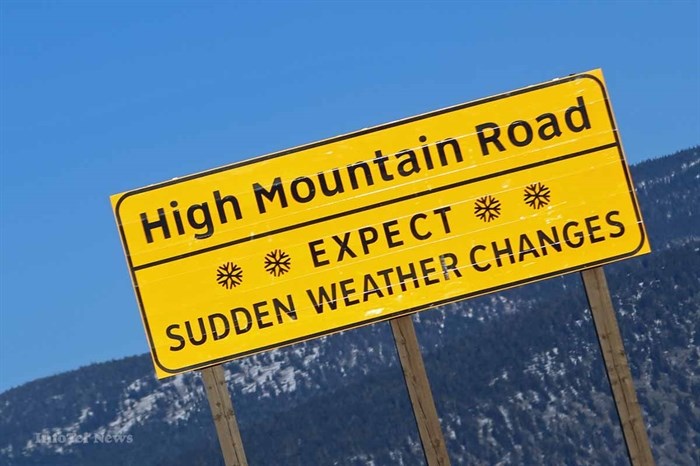
Image Credit: FILE PHOTO
January 18, 2020 - 8:00 AM
With the winter weather bringing many surprises like cars that don’t start and frozen fingertips, there a few other things you might not know which can help make the cold and snowy season a little more livable.
1. Although many cities require homeowners and renters to shovel snow from their sidewalks, it's kind of a legal grey area. A judge found these Vancouver homeowners not liable for injuries that happened on their icy sidewalk. Cities such as Kamloops state the individual is responsible for snow clearing and fire departments noted that clearing snow from fire hydrants is also a necessary snow-clearing step. Regardless of the legality, we can all probably agree it's just the right thing to do.
2. When you're clearing snow, don't forget about utilities. Fortis B.C. recommends homeowners and renters ensure their natural gas meter is kept clear of snow and ice to ensure safety where the gas enters the building. They recommend clearing the meter as well as a path up to it and remind people not to kick the ice or snow off, suggesting rather to call Fortis if there is an ice build-up. For snow, they advise removing it by hand until the shut-off valve and regulator are clear.
3. Another home issue that could arise from heavy snowfall are issues from snow on your roof. If you notice your ceiling is sagging, has new cracks or leaks, you may be in trouble. Even without the obvious signs of roof issues, you may be able to identify a problem from windows and doors that are difficult to open or unusual popping sounds, according to this insurance company’s website. They recommend using an extendable snow rake to pull snow off your roof, or hiring a professional, insured snow removal company. Homeowners need to be aware of things like ice dams, ridges of ice that form when at the edge of the roof, preventing melting snow from draining off the roof. Controlling heat loss is crucial to prevention.

Melting snow forms an ice dam on an Okanagan roof. The problem is more prevalent in the region this year as cold temperatures and heavy snow set up the condition, made worse by moderating temperatures this week.
(STEVE ARSTAD / iNFOnews.ca)
4. Protect your vehicle as well. If you’ve found that your car won’t start on a cold morning, you’re not alone. Technological issues, frozen emergency brakes and cold fluids can lead to a car that simply won’t move. One of the things that may affect your vehicle is the viscosity of gasoline. According to this automotive website, gasoline can begin to harden at -40C. The fuel gauge in your car may register more fuel than you actually have, as the gasoline cools. Some ways to prevent frozen gas lines include running your vehicle often, as even short drives can get the fuel flowing. Ensure your tank has at least a quarter tank of gas, because having less fuel puts it at a higher risk of freezing, and you can avoid being stranded in case your meter is reading more gas than there actually is.
5. You may wonder why some trucks release brine while others drop solid salt crystals on the road. According to this website, brine is used as a preventative measure before a winter storm comes. The brine, made of sodium chloride and water, is sprayed to prevent ice and snow from freezing to the roadway. Brine requires about one quarter or one-third of the material that salting does, which makes it a more cost-effective option for cities. The City of Calgary is also experimenting with a beet brine to reduce the amount of salt on the roads.
6. It's called four-wheel drive, not four-wheel stop. With the roadways a mess after a heavy snowfall, some people may think that the four-wheel-drive helps with stopping faster and offers better control of the car. According to an article from Forbes, four-wheel drive may help you get a bit of extra grip in low-traction situations over ice, but it doesn’t do much for going around corners and does virtually nothing to help with braking. The best way to ensure road safety is to install adequate winter tires. They refer to studies that have shown front-wheel-drive cars with snow tires can outperform an all-wheel-drive car with all seasons in snowy conditions.
7. If you have to travel in this weather, here's some ways you can prepare. Get winter wipers for your windshield, start your trip with a full tank of gas, have extra winter windshield washing fluid and ensure your rear window defroster is working properly, according to this insurance website. Another thing to consider during the winter season is your tire pressure, with some auto manufacturers advising to keep PSI (pounds per square inch) at three or five pounds higher as tire pressure decreases by one PSI for every five-degree Celsius drop.

FILE PHOTO
(KIM ANDERSON / iNFOnews.ca)
8. If you're driving any mountain passes in B.C. — and aren't they all? — you have to be prepared for everything. The Ministry of Transportation has constantly remind drivers that even though you are headed to mild Vancouver — or from Vancouver — flip flops and shorts aren't going to cut it. Make sure to wear proper attire such as warm footwear, gloves, a hat and warm clothing. Packing your vehicle with blankets, extra clothing, an ice scraper, a small shovel, mechanic gloves, jumper cables, bottled water, food and a flashlight can turn a roadside breakdown from a life-threatening situation to a winter road trip story.
9. Being prepared for winter conditions can literally save your life. With the cold temperatures and high winds, frostbite and windburn can occur quickly and can have lasting effects. Environment Canada recommends warming affected extremities such as fingers, ears, and toes with body temperature water, warm blankets, or other warming methods. They warn against rubbing or shaking the injured skin, as it could cause more damage.
10: Plug your vehicle in when it gets cold. When you start your engine, it's trying to push oil around the components to keep them lubricated but that oil doesn't flow the same when it's cold. Most vehicles sold in Canada have a regular 12-volt adapter to keep the engine block warm. Most newer vehicles should start no problem at temperatures approaching -30 C but if temperatures are anywhere near close to that, plug it in. You may also want to make sure your battery is in good shape. Cold and any battery are not good mixes, but most other things that take batteries won't leave you stranded. Batteries should last three to five years but if you're having trouble starting, that's probably your problem.

(JENNIFER STAHN / iNFOnews.ca)
11: If you’re heading away on vacation for an extended period, it’s a good idea to turn off your water heater and shut off the water supply to your home. If the hydro goes off for an extended period of time while you’re away, at least you won’t have a flood to contend with when you return. A complete list of home protection ideas can be found here. It’s a good idea to check with your insurance company as well. Some insurers may insist you have someone monitor your residence on a regular basis while you’re away.
12: Use caution when plugging in that extra heater during a cold snap, and make sure to use certified power bars if you are plugging in multiple items into one socket. You also need to make sure there is no more than 1400 watts on a circuit. Take care not to overload power bars, outlets, or circuits. Check with this BC Hydro website for more hints on winter safety.
Got any other tips? Leave them in the comments below.
To contact a reporter for this story, email Jenna Wheeler or call (250) 819-6089 or email the editor. You can also submit photos, videos or news tips to the newsroom and be entered to win a monthly prize draw.
We welcome your comments and opinions on our stories but play nice. We won't censor or delete comments unless they contain off-topic statements or links, unnecessary vulgarity, false facts, spam or obviously fake profiles. If you have any concerns about what you see in comments, email the editor in the link above.
News from © iNFOnews, 2020